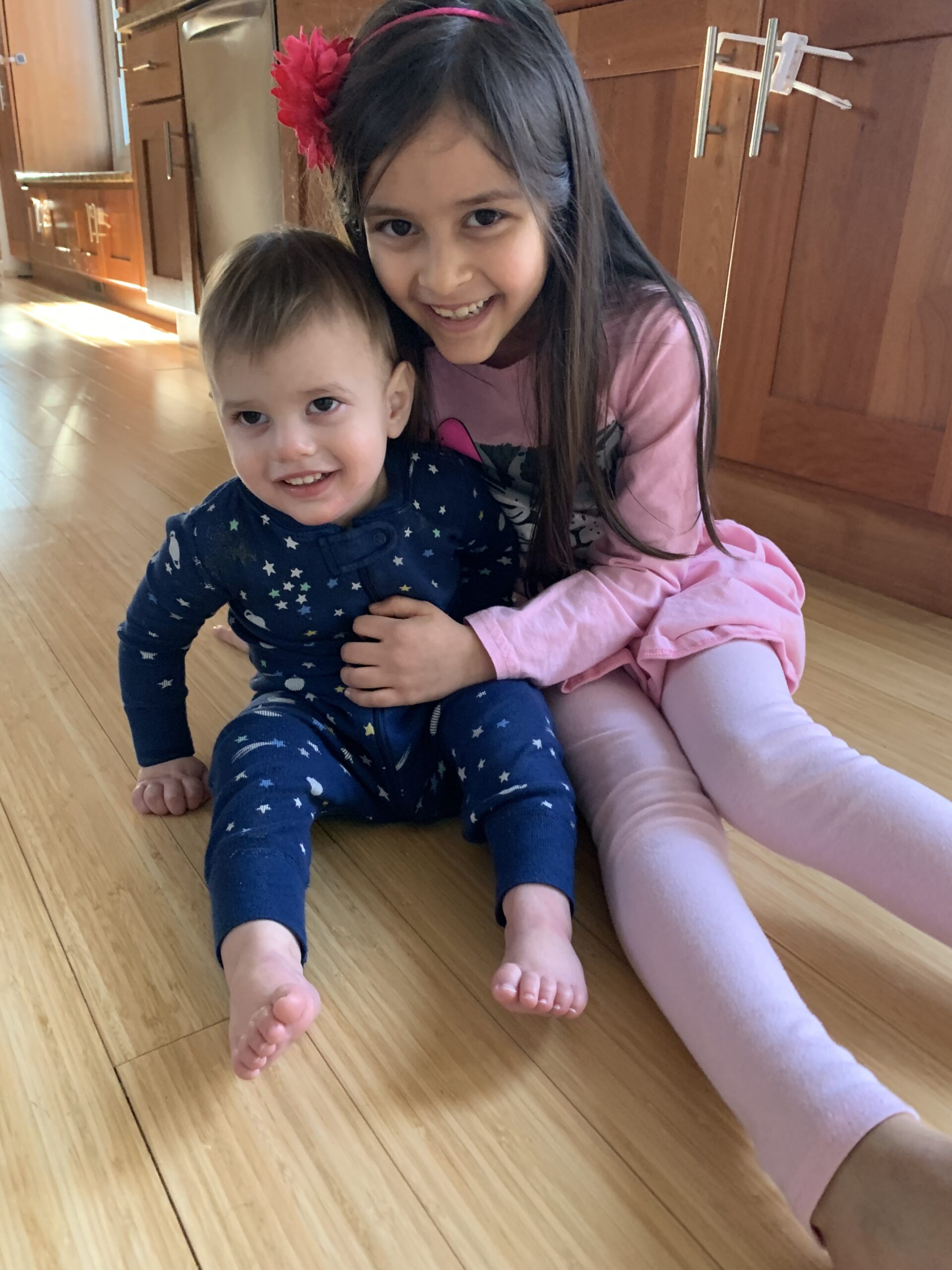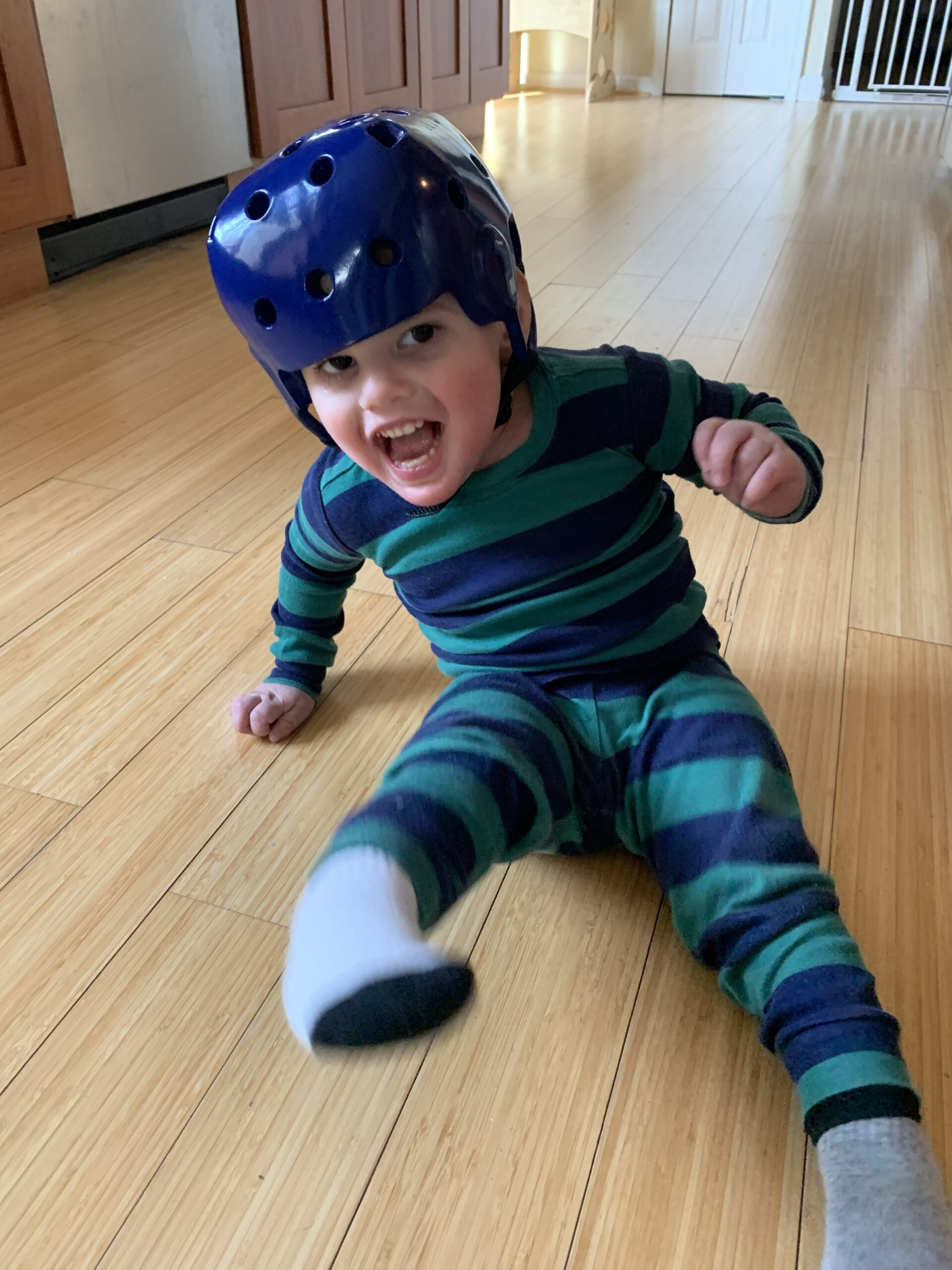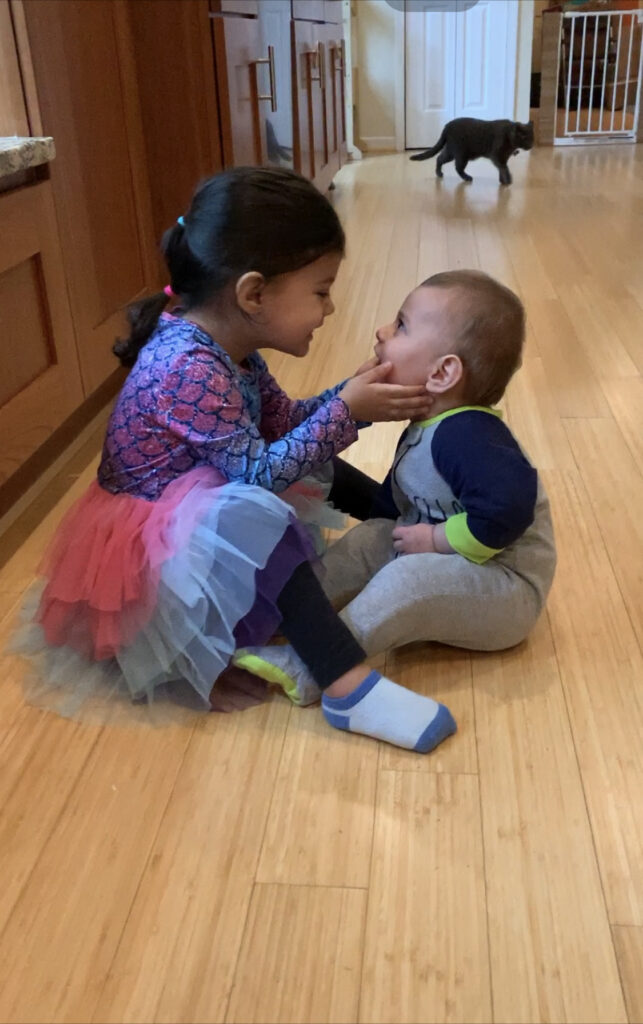
Name: Marie Howe Zaman
Location: Virginia, United States
Child’s Birth Year: 2019
Keywords: Seizures/Epilepsy, PTSD & Mental Health
Marie and her husband have three children, Fatimah, Ayah, and Yusuf. Marie’s husband works as an internal medicine physician, and Marie is training to become a nurse practitioner. In August of 2019, with Yusuf’s traumatic birth and subsequent HIE diagnosis, Marie’s world was flipped upside down.
During Marie’s pregnancy, she never even knew HIE could be a possibility. Since she carried Yusuf for a full forty weeks, she assumed they were in the clear for any major complications, since they made it past the potential for prematurity. At the forty-week mark, after Marie’s water broke, her labor didn’t start naturally. Eventually, she was admitted to the hospital. It wasn’t until the next morning, once Yusuf was already in distress, that Marie had an emergency C-section. The C-section was fraught with issues—the epidural did not fully work, so Marie received general anesthesia—but for the most part, Yusuf seemed relatively fine.
A few hours later, however, when Marie was finally able to hold him, Yusuf seemed really still, and he had difficulty latching. Suddenly, Yusuf stopped breathing, and alarms started going off. Clinicians rushed into the room to stabilize Yusuf.
After this scare, everyone again thought he was going to be okay. It wasn’t until a little later, when a nurse noticed that Yusuf had seizure-like movements, that he was transported by helicopter to a higher-level hospital in Washington, DC, to receive cooling therapy. This horrible, surreal experience will forever be etched in Marie’s memory, watching her little baby boy seizing and being bundled away. In perhaps the most terrifying moments of her life, she wasn’t even given the space and respect to process her emotions, but was, instead, probed by helicopter crew members with questions about insurance.
After Yusuf was transferred, Marie didn’t see him or her husband for the next few days, as she needed to recover from her C-section surgery. Eventually, she was able to join them in DC, where Yusuf spent a total of eighteen days in the NICU. Yusuf was dependent on a ventilator for a while, and because of that, Marie wasn’t able to hold him. Not being able to bond with her son in that conventional way was extremely difficult for Marie, and on top of that, the physicians seemed to handle her with kid gloves. When she needed answers most, information was hard to come by.
MRI day is particularly challenging for many HIE families, and Marie’s experience was no exception. As she entered the conference room for the family meeting, Yusuf’s MRI summary had already been pulled up on the large projector screen. Before the physicians had the chance to turn the projector off, Marie glanced up, and the first words her eyes landed on were “severe and extensive.” To see these words was beyond overwhelming, and Marie went numb…all the worst-case scenarios she had conjured up in her mind were no longer a figment of her imagination. After days of deafening silence from the medical providers, all this information flooded down on Marie at once. It seemed like physicians were throwing out predictions left and right, giving a prediction about Yusuf’s future one instant and then saying something contradictory later. Although Marie craved predictions about Yusuf’s prognosis at the time, she now realizes it was counterproductive—no one really has the power to predict the future, especially with a condition like HIE.
At the time, Marie was not mentally prepared to see Yusuf’s MRI images. Almost two years later, she still has never seen them…and that is completely okay. There is a deep-rooted narrative of resiliency surrounding HIE parents that, while good-intentioned, can, quite frankly, be exhausting. Being strong 24/7 is impossible, and Marie hopes HIE parents know that, just because they are struggling, it doesn’t mean they’re failing.
She wishes someone had told her this early on in her own journey. When Yusuf was in the NICU, Marie needed providers to hold space for her and allow her to feel grief. However, what she received was invalidation. When she attempted to be honest about her pain, she heard statements such as, “You can’t cry, you need to be strong for your other children” or “Yusuf will be fine; you’re overreacting.” The one mental health screening she received happened in front of her family members, so being candid seemed out of the question. When asked how she was feeling, she wanted to scream, “I want to die right now!” Instead, she resorted to the more socially acceptable answer of “fine,” keeping her true emotions bottled up inside. She was constantly made to feel like she was grieving incorrectly. However, in a situation as impossible as this, there really is no correct way to grieve. Just being present, struggles and all, is more than enough.
Marie also felt invalidated by providers who didn’t listen to her concerns about Yusuf’s health. When she noticed recurrent seizure episodes in her son, providers were quick to say that she was reading too much into the situation. They agreed to monitor Yusuf with a thirty-minute EEG, but even when it showed abnormal activity, the clinicians said, “He’s an HIE child, of course it’s going to be abnormal.” Then, they changed their opinions, stating Yusuf actually had dystonia.
As Marie was grieving the new diagnosis of dystonia, they once again changed their minds, stating Yusuf actually had reflux. Once he was started on reflux medications, and the episodes were still happening multiple times a day, the clinicians finally ordered a longer two-hour EEG. Just as Marie suspected, the EEG indicated Yusuf had been having uncontrolled seizures all along. If the clinicians had believed Marie from the beginning, two misdiagnoses and six weeks of uncontrolled seizures could have potentially been avoided. Thus, Marie’s biggest piece of advice for clinicians is just to listen to HIE parents. Take their concerns seriously and acknowledge that they know their children best. By empowering parents, and making them feel heard, clinicians can foster a culture of collaboration and mutual trust between themselves and parents.
Similarly, Marie’s advice to HIE parents would be to find providers who will truly serve as allies, for only when there is a crucial foundation of respect, transparency, and teamwork can the child receive the best care possible. Building this strong rapport takes openness on the part of parents as well. If you don’t feel comfortable with a provider, don’t be afraid to tactfully fire them, no matter how accomplished they may be. Marie fired a well-renowned physician because he couldn’t keep track of the details of Yusuf’s case, and she doesn’t regret the decision for a second. This physician kept increasing the dosage of a medication that caused her son to lose weight and become clinically malnourished. It wasn’t until Marie did her own research and realized that weight loss could be a side effect, that Yusuf was taken off the medication. Within twelve hours of going off the medication, Yusuf’s appetite had already come back. While parents should acknowledge a physician’s expertise, Marie encourages them to also do their own research, ask questions, and, most of all, listen to their gut. Rewards and recognition are no substitute for human connection.
A second piece of advice Marie has is to be as candid with siblings of the HIE child as possible. Marie never hid anything about Yusuf’s condition from her two daughters. She explained to them that “Yusuf’s brain was hurt when he was born, which means there are some things that are harder for him to do than they are for us, and there are some things that he may never do.” Marie was scared to see her daughters’ response, but she will never forget one of her daughters so sweetly and matter-of-factly stating, “Well, we’ll just have to love him.” It was such a pure and heartwarming moment, in the midst of the difficult journey. To this day, that’s what fuels Marie through all the uncertainty and grief—loving Yusuf unconditionally.
Yusuf truly has been one of Marie’s biggest inspirations and teachers, and Marie remains constantly in awe of just how resilient he is. Even the doctors are stunned by just how quickly Yusuf is able to bounce back after his seizures. Despite his hemiplegic cerebral palsy, which makes it difficult for him to walk, Yusuf doesn’t let that slow him down. It seems like he falls a million times a day, but no matter how many bumps or bruises he gets, he never stays down for long. Yusuf has no concept of “Will I ever walk?” or “What will my future look like?” Instead, he takes everything one step at a time, immersing himself in the present moment.
In the moments where Marie finds herself falling down the rabbit hole of worrying about what Yusuf’s life might look like, she tries to match his remarkable ability to remain grounded in the present. And in these same moments when she feels overwhelmed, the mantra Marie tells herself is simple, but to the point: “Do something. You’ll feel better.” Whether it’s reading Yusuf one more book, or taking one more shot at the gait trainer, these seemingly small acts go a long way.
Even though living in this perpetual state of uncertainty has often been exhausting, Marie is proud of how much she has personally grown. Before Yusuf, she struggled with being a people pleaser. However, she has now come to realize that it’s not her duty to make sure those around her are comfortable. What’s most important to her is making sure Yusuf receives the best care possible. If that means speaking her mind, even if it ruffles a few feathers, then so be it. She has learned to become a fierce advocate for her son, because no one else is going to do it for her.
For instance, doctors told her that Yusuf would struggle with seizures for the rest of his life, since he had already failed on six different antiepileptic medications. Marie didn’t passively accept this fate, but spent hours reading different research articles and posting on forums, such as Hope for HIE, to find a medication that might work. After hours and hours of searching the web, she came across a medication that seemed promising, not letting the skepticism she received from clinicians silence her. Because Marie was not afraid to use her voice and speak her mind, Yusuf has been seizure-free since starting the medication.
Ultimately, Marie just feels incredibly grateful for Hope for HIE. She truly cannot imagine going through all this without the compassionate, genuine, and vibrant people she has connected with in the community. She views Hope for HIE as her anchor, keeping her from floating adrift in a sea of uncertainty. The people she has bonded with keep her humble, make her laugh, and nourish her hope, even in the most overwhelming moments. For so long in her journey, the social isolation Marie experienced was suffocating. By finding this supportive community, Marie realized she didn’t need to go through life keeping her genuine emotions buried. She now knows, just because she grieves for the future Yusuf will never have, that does not mean she doesn’t also love him for who he is. Feeling sad at times does not make her any less of a mom.



Connect with families, read inspiring stories, and get helpful resources delivered right to your inbox.